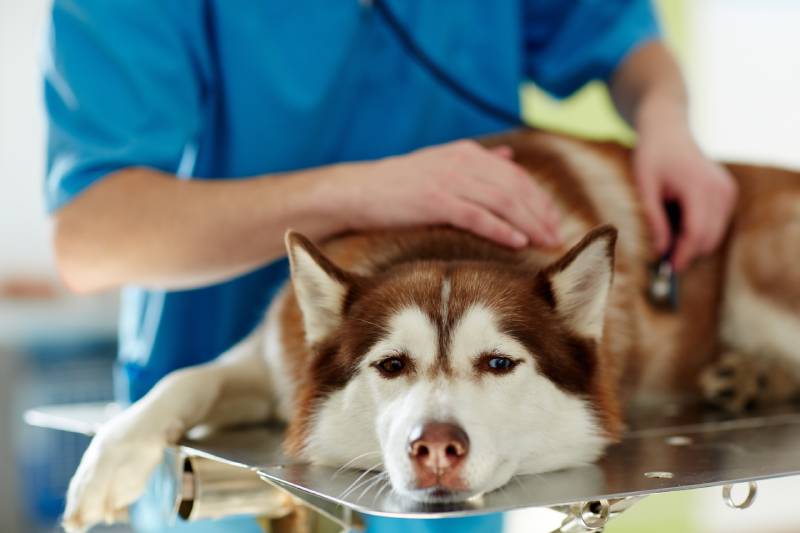The Maltese is a popular toy breed known for their signature long, silky coat. Ever since their acceptance as a breed by the American Kennel Club (AKC) in 1888, the breed has remained consistently popular, ranking in the top 40 breeds in the US (by popularity) as of 2022.1
In addition to their coats, they’re known for their affectionate nature, playfulness, and sociability. With all popular breeds, prospective adopters might be curious about their breeding physiology. In this article, we’ll go over the Maltese pregnancy in a bit more detail.
Should I Breed My Maltese?
The prospect of having a litter of Maltese puppies running around the house might seem enticing to many first-time owners. However, there are many reasons why veterinarians recommend that breeding these dogs is best left to the breeder.
- Breeding is risky. Mistiming the process of breeding or misinformation about your dog’s characteristics might result in a mating attempt that goes awry. Your female Maltese might be left too traumatized by the ordeal and wouldn’t want to mate anymore.
- Pregnancy is risky. The pregnancy itself is also risky for a toy breed, as they are by far the most commonly presented breeds for dystocia (difficulty giving birth).
- Puppy care is expensive. Puppies require a great deal of time, effort, and money to ensure they’re all cared for properly. Assuming that all of a litter will be adopted is naive, and sometimes a puppy might be a permanent addition to the family.
- Brachycephalic concerns. Maltese are borderline brachycephalic. Many veterinarians discourage breeding of these breeds, as their conformation renders them prone to many ailments and a lower quality of life – issues that can’t be overcome by good ownership alone. Brachycephalic breeds also require additional care & special nutrition during pregnancy.
- Breeding tests. Sometimes, an animal may be a poor candidate for breeding because of their genes. Breeding is only encouraged by animals that are registered and checked for several health conditions. The Maltese in particular needs tests for serum bile acids, patella exams, and a cardiac exam as a minimum before being allowed to breed.
- Canine Pregnancy is Complicated. The physiology of a dog’s pregnancy isn’t as straightforward as other species, and establishing a pregnancy timeline for dogs isn’t easy (and in some cases is impossible) for reasons we’ll explain in further detail in this article.

How Long Are Maltese Pregnant For?
The average length of pregnancy in a dog is 63 days. However, the length of pregnancy can be as short as 56 days or as long as 69 days. Broadly speaking, this is attributed to the unique mating physiology of dogs:
- Dog sperm can remain viable in a female dog’s uterus for up to 8 days after a single mating.
- Estrus, or mating behavior (when a female allows a male to mount her) can happen anytime between 5 days before eggs are released by the female (a process known as ovulation) or up to 3 days after it.
- The eggs released by the female can remain viable for fertilization for up to 6 days after they’re released.
These 3 factors all mean that there’s a massive time window where a sexually mature female dog can breed, ovulate, and have fertilized eggs that end up as viable, and eventually implant into the uterus and develop into puppies.
Therefore, a “late mating” results in a short pregnancy (as short as 56 days) whereas an “early mating” results in a longer than average pregnancy (as long as 69 days). This phenomenon also means that it’s very difficult to depict a “weekly” timeline of a dog’s pregnancy, as the pregnancy can last anywhere from 8 to almost 10 weeks.
Nonetheless, key pregnancy events can be tracked in dogs. The complication of “days after mating to fertilization” means other factors need to be used. Canine pregnancy (and its associated events) are usually tracked by events that should happen by certain days of the surge of a specific hormone (known as the luteinizing hormone) – a spike in this hormone signals the imminent release of eggs, and partiturtion (the birth of puppies) usually happens 64-66 days after this event.
Key Maltese Pregnancy Events
Assuming a successful mating and pregnancy of 9 weeks (63 days), these are some of the key events that happen in the pregnancy.
Weeks 1-3
- Day 10-12. Fertilized eggs actively undergoing division (now termed as blastocysts) enter the uterus. They eventually turn into embryos.
- Day 18-20. Uterus swells, and the embryo vesicles can be detected on an ultrasound at around this time.
- Day 21. Developing embryos attach to the uterus with a thin layer of cells known as a trophoblast. They implant into the uterus by Day 22.
During this time, some behavioral changes can be observed in your Maltese. She may appear more lethargic, affectionate, or moody. Her nipples may begin to swell (usually around the 2nd or 3rd week), and she may begin to gain some weight around her stomach. However, this weight gain is very difficult for an untrained individual to notice.

Weeks 4-6
- Day 24-25. A fetal heartbeat can be detected by an ultrasound.
- Day 35. Fetal movement can be detected on an ultrasound.
- Puppies grow very rapidly in utero till at this point.
Puppies do most of their in-utero growing by about week 5, so this phase is mostly marked by increased hunger for most pregnant dogs, alongside some of the aforementioned mood changes.

Weeks 7-9
- Pregnancy is very obvious.
- Drastic weight gain occurs at this phase of pregnancy.
- Fetuses can be counted by an X-ray by week 8.
- Most female dogs tend to lose their appetite towards the end of their pregnancy.
Roughly 2 days before a Maltese is about to give birth, she may most likely display some of these signs:
- Drowsiness
- Agitation
- Anxiety
- Nesting
- A lack of appetite
Does My Maltese Need Veterinary Care During Pregnancy?
Absolutely. The signs of pregnancy discussed in this article are not exclusive to pregnancy only, and the mood changes in particular can be associated with many different ailments. Veterinary care for a pregnant dog is absolutely imperative. Pregnant and lactating dogs also have different nutritional needs, which you should discuss with your veterinarian throughout their pregnancy.
Toy breeds such as the Maltese may often experience dystocia (difficulty giving birth). Immediate veterinary care is required if you notice your dog struggling to push a puppy out for over 30 minutes with no success, the entire process is taking more than 12 hours, green discharge from the vulva, or if you observe an exceptionally high amount of blood being passed from your dog’s vulva.
Final Thoughts
The average Maltese pregnancy lasts around 9 weeks. However, the date of mating is a poor indication of pregnancy duration in all dogs, including the Maltese. That being said, there are several changes that happen in a pregnant Maltese, which we’ve discussed in this article. Veterinary care is absolutely essential for all pregnant dogs, and the Maltese is no exception to this rule.
Featured Image Credit: TamaraLSanchez, Shutterstock












